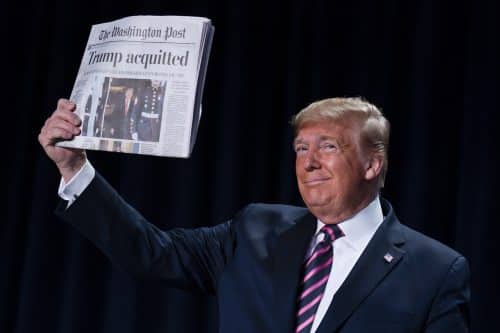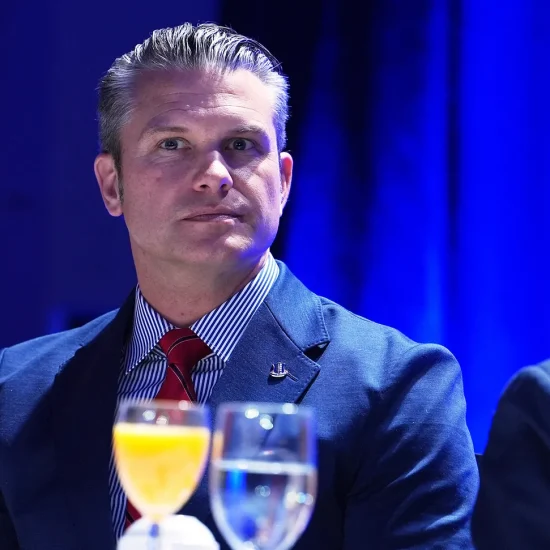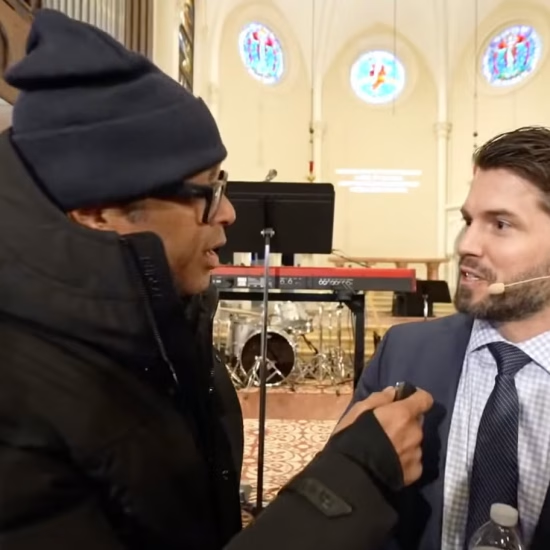
Donald Trump Jr. would like to suggest an edit. To the Bible.
Speaking on Sunday (Dec. 19) at a conference in Arizona he claimed that while liberals are “playing hardball,” conservatives stay nice and are just “playing tee-ball” (though just because Junior still needs the tee doesn’t mean others haven’t figured out how to throw some spin). Thus, he urged the crowd of activists at the event sponsored by Turning Point USA, a conservative political group created by Charlie Kirk, to “band together” and fight back against an alleged “cancel culture.”
To accomplish this, however, they’ll have to put aside (ahem, cancel) some teachings of Jesus.
“We’ve turned the other cheek and I understand sort of the biblical reference, I understand the mentality, but it’s gotten us nothing,” Trump Jr. complained. “Okay? It’s gotten us nothing while we’ve ceded ground in every major institution in our country.”
Since both Trump Jr. and Kirk attack Democrats as against churches or anti-God, the comment particularly jumped out. Trump Jr. didn’t merely reject the generic idea of avoiding retaliation but specifically took issue with the substance of a biblical teaching, one offered by none other than Jesus.

Screengrab of Donald Trump Jr. speaking at a Turning Point USA event on Dec. 19, 2021.
It’s tempting to dismiss the rantings of an unaccomplished son of a failed businessman turned failed politician, but the remark echoes several others made in recent years. In a quest for political power, the Trumps and their supporting preachers often take a stab at rewriting core biblical ideas. And at the top of the hit list is usually Matt. 5:39. Excising the red letters about turning the other cheek could create quite a, well, turning point for faith and politics.
In this issue of A Public Witness, we take off the extra layers to expose the anti-cheek turning rhetoric employed by the Trump family and their preachers. Then we go the extra mile to consider what we can learn about this effort from another presidential effort at biblical editing: the “Jefferson Bible.”
Bible Thumper
Trump Jr. demonstrated on Sunday that he inherited his father’s theology. As the elder Trump ran for president in 2016, he received what should’ve been a softball question for a candidate seeking the votes of evangelicals. A conservative radio talk show host asked him about his favorite Bible verse. The errant swing by Trump suggested he needed a theological tee.
“Well, I think many,” he hemmed and hawed, perhaps hoping an actual verse would come to mind. “I mean, when we get into the Bible, I think many, so many. And some people, look, an eye for an eye, you can almost say that. That’s not a particularly nice thing. But you know, if you look at what’s happening to our country, I mean, when you see what’s going on with our country, how people are taking advantage of us, and how they scoff at us and laugh at us. … And we have to be firm and have to be very strong. And we can learn a lot from the Bible, that I can tell you.”
That wasn’t Alec Baldwin on Saturday Night Live. That was the real Trump, who apparently started reading the Bible from the beginning and gave up long before making it to Matthew (maybe because Trump just likes people who weren’t exiled).
In case either of the Trumps are reading, the “eye for an eye” reference in the writings of Moses comes back up in Jesus’s Sermon on the Mount. The teaching to “turn the other cheek” is literally offered as a rebuttal to the “eye for an eye” mindset. Rejecting cheek-turning and endorsing eye-stabbing are two sides of the same bloody coin. Regardless which side lands up, you bet against the way of Jesus.
That Trump would gravitate toward “an eye for eye” shouldn’t surprise us. Before that radio interview, he told Liberty University students during a chapel service to “get even” with people. And he also emphasized the need to “have a prenuptial agreement” before getting married — advice perhaps derived from his experience but which also means ignoring Jesus’s admonitions against divorce that come just seven verses ahead of the “turn the other cheek” line. Liberty’s president at the time, Jerry Falwell Jr., responded to the chapel “sermon” by proclaiming his hope that Trump would become president. Falwell, of course, no longer leads the school following his own departures from biblical teachings.
Melania Trump joined in the family business by bragging during the 2016 campaign, “As you may know by now, when you attack him he will punch back 10 times harder.” So, there goes another passage in Matthew. Forget forgiving 7 times or 77 times, for this new gospel says hit back by a factor of 10.
Lest there be any doubt about his theology, then-President Trump took to the pulpit at the National Prayer Breakfast in 2020 to explicitly make the case for cutting out the Sermon on the Mount. At that event, Harvard professor Arthur Brooks gave a keynote about the importance of love amid growing polarization in the country.
“Some people say we need more civility and tolerance. I say, nonsense,” Brooks declared. “Why? Because civility and tolerance are a low standard. Jesus didn’t say, ‘Tolerate your enemies.’ He said, ‘Love your enemies.’ Answer hatred with love.”
As an altar call of sorts, Brooks asked attendees to raise their hands if they love someone with whom they disagree politically. Hands shot up across the room. But not Trump’s.
And then when it was his turn to speak, Trump admitted, “Arthur, I don’t know if I agree with you.” Trump proceeded to practice what he preached by going after politicians of both parties who had voted to impeach him, including lobbing attacks on the faith of Sen. Mitt Romney and Rep. Nancy Pelosi.

Then-President Donald Trump waltzed onto stage at the 2020 National Prayer Breakfast to declare victory over his political “enemies.” (Evan Vucci/Associated Press)
The next month, Trump participated in a Fox News town hall, where someone asked him why he uses “insult politics” and “controversial rhetoric” that doesn’t unite the country. Trump would have nothing of it, arguing that would’ve kept him out of the Oval Office.
“When they hit us, we have to hit back,” he insisted. “I wouldn’t be sitting up here if I turned my cheek. … You can’t turn your cheek.
We won’t claim “Jesus wept” is our favorite Bible verse, but it fits in moments like this.
 NOTE: The rest of this piece is only available to paid subscribers of the Word&Way e-newsletter A Public Witness. Subscribe today to read this essay and all previous issues, and receive future ones in your inbox.
NOTE: The rest of this piece is only available to paid subscribers of the Word&Way e-newsletter A Public Witness. Subscribe today to read this essay and all previous issues, and receive future ones in your inbox.






